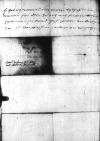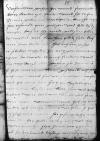List #5831
Johann Albrecht of Brandenburg-Ansbach do Ioannes DANTISCUSInnsbruck, 1530-05-27
| odebrano Mantua, 1530-05-30 Rękopiśmienne podstawy źródłowe:
Pomocnicze podstawy źródłowe:
| ||||||
Tekst + aparat krytyczny + komentarz Zwykły tekst Tekst + komentarz Tekst + aparat krytyczny
Meyne paper damaged⌈[Meyne]Meyne paper damaged⌉m wesundern guten hern paper damaged⌈[guten hern]guten hern paper damaged⌉ und freunt paper damaged⌈[t]t paper damaged⌉
Zw eyge paper damaged⌈[Zw eyge]Zw eyge paper damaged⌉en hand(en)
Wesunderer gutter her unnd freundt.
Euer
So hadt mir mein bruder geschribe(n), ich sel euch wyderumb seer von seinetbegen grusen und pit euch, seine sach pey
G hidden by binding⌈[G]G hidden by binding⌉ebe(n) zu
Postscript:
So hab ich vernome(n), wy yr ein bischoff in


 AAWO, AB, D.90, f. 15v
AAWO, AB, D.90, f. 15v